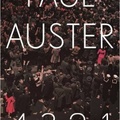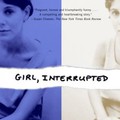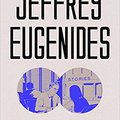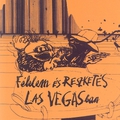Walker Percy: The Moviegoer

I used to go to the movies a lot as a teenager, and there were some years when I saw virtually every new film released in Hungary. Of course this wouldn’t be a big achievement nowadays and I wouldn’t even have to go to the cinema to watch every new release, but this doesn’t matter now. What matters is that I came across the title of this novel about thirteen years ago and I’ve been planning to read it ever since. I didn’t care what the story was about, it was enough that I knew the title because I was sure that a book called The Moviegoer had to be my kind of book. But before I could read it, I had to tackle some obstacles, mainly, I had to learn English, because the novel never came out in Hungarian – which is something I understand now that I read the novel. But more about this later. Anyway, I finally got hold of a copy and read it, but as it usually happens, the novel wasn’t exactly what I expected it to be.
The story takes place in the 1950s, and the protagonist is Binx Bolling, a man from a wealthy old New Orleans family. He works as a bondsman, and in his free time he strikes up relationships with all his new secretaries, goes to the movies, and goes rambling in the New Orleans suburbs while meditating about his life. The story consists of a series of small episodes, memories and desires, with the Mardi Gras carnival going on in the background. While the carnival is going on full swing, the family background, the war memories and the future plans of the protagonist are gradually revealed.
Binx is a man on a constant quest who lives his life in his imagination and not in the real world. He is continuously looking for patterns and recurrent images in the world, and he is also looking for God, himself and, most importantly, the possibility of a real life. His biggest fear is that he will be entrapped in everyday reality, and during his quest, he hopes to find the antidote to the mundane.
Binx is an ambiguous and unknowable character. At first he seems to be a disagreeable person: an obsessive, cynical, money-grabbing and selfish womanizer. But we soon get to know the other side of his personality: his fears, anxieties, doubts, and his all-permeating sadness. For instance, we learn that Binx has a fear of travelling because it’s hard for him to get used to the fact that in other parts of the country, people relate to the world differently; and we also learn that despite his cynicism he strongly believes that people are basically good and kind – only, the fact that everyone is good and kind fills his heart with some inexplicable sadness. And small details like these help to make his behaviour understandable, if not appealing.
Among the usual review quotes printed on the cover there is one which says that The Moviegoer is The Catcher in the Rye for adults, and this comparison certainly seems apt: Binx is caught up in the same trap of existentialist thoughts and has the same problems adapting to the world and to himself as Holden Caulfield; the smallest things can make him sad, he wants to run away from everything which is ordinary, and even his style resembles that of Holden.
Besides The Catcher in the Rye, the novel reminded me of Hemingway’s The Sun Also Rises, too. Percy describes the New Orleans carnival with the same great style and gusto as Hemingway depicts the Fiesta in Pamplona, and just like in Hemingway’s novel, there’s a strong sense of foreboding lingering in this novel, too – you constantly feel that something irreversible will happen before the carnival is over. As you might guess, The Moviegoer isn’t lacking in dramatic tension, however, the story ends with a huge anticlimax – which is a bit disappointing but truly understandable. Given the fact that the 20th century is the age of anti-heroes, it would hardly have been believable if Binx’s quest had ended with the man discovering some kind of world-shattering solution which would have enabled him to avoid the mundane forever.
As I mentioned, the book never came out in Hungarian, and the reason for this may be that this is a very American novel. The cover of my copy says that The Moviegoer is a masterpiece which is bound to evoke nostalgic feelings in every American. It’s not an accident that the cover says „every American” instead of „every person”. Despite the fact that the American South is well-known everywhere from the works of such authors as Carson McCullers, William Faulkner and Truman Capote, I feel that Percy’s novel features an extraordinary dose of American-ness and Southern-ness, and this makes the novel difficult to appreciate if the reader is not an American. For instance, when Binx travels to Chicago and gets to thinking that no-one can maintain such an ambiguous relationship with a Northern city as a man from the South, I got the sense that being a European woman instead of a woman from the American South, I have no chance to grasp the peculiarities of this relationship, ever.
Perhaps it is due to this sense of strangeness that despite the interesting, philosophical themes, the cynical-melancholic style, the beautifully poetic repetitions weaving through the text, and the sometimes truly dramatic soul-searching I still feel that I missed the point of this novel, couldn’t get to the depth of the story and the characters, and couldn’t really get to know the fictional world of The Moviegoer.
The story takes place in the 1950s, and the protagonist is Binx Bolling, a man from a wealthy old New Orleans family. He works as a bondsman, and in his free time he strikes up relationships with all his new secretaries, goes to the movies, and goes rambling in the New Orleans suburbs while meditating about his life. The story consists of a series of small episodes, memories and desires, with the Mardi Gras carnival going on in the background. While the carnival is going on full swing, the family background, the war memories and the future plans of the protagonist are gradually revealed.
Binx is a man on a constant quest who lives his life in his imagination and not in the real world. He is continuously looking for patterns and recurrent images in the world, and he is also looking for God, himself and, most importantly, the possibility of a real life. His biggest fear is that he will be entrapped in everyday reality, and during his quest, he hopes to find the antidote to the mundane.
Binx is an ambiguous and unknowable character. At first he seems to be a disagreeable person: an obsessive, cynical, money-grabbing and selfish womanizer. But we soon get to know the other side of his personality: his fears, anxieties, doubts, and his all-permeating sadness. For instance, we learn that Binx has a fear of travelling because it’s hard for him to get used to the fact that in other parts of the country, people relate to the world differently; and we also learn that despite his cynicism he strongly believes that people are basically good and kind – only, the fact that everyone is good and kind fills his heart with some inexplicable sadness. And small details like these help to make his behaviour understandable, if not appealing.
Among the usual review quotes printed on the cover there is one which says that The Moviegoer is The Catcher in the Rye for adults, and this comparison certainly seems apt: Binx is caught up in the same trap of existentialist thoughts and has the same problems adapting to the world and to himself as Holden Caulfield; the smallest things can make him sad, he wants to run away from everything which is ordinary, and even his style resembles that of Holden.
Besides The Catcher in the Rye, the novel reminded me of Hemingway’s The Sun Also Rises, too. Percy describes the New Orleans carnival with the same great style and gusto as Hemingway depicts the Fiesta in Pamplona, and just like in Hemingway’s novel, there’s a strong sense of foreboding lingering in this novel, too – you constantly feel that something irreversible will happen before the carnival is over. As you might guess, The Moviegoer isn’t lacking in dramatic tension, however, the story ends with a huge anticlimax – which is a bit disappointing but truly understandable. Given the fact that the 20th century is the age of anti-heroes, it would hardly have been believable if Binx’s quest had ended with the man discovering some kind of world-shattering solution which would have enabled him to avoid the mundane forever.
As I mentioned, the book never came out in Hungarian, and the reason for this may be that this is a very American novel. The cover of my copy says that The Moviegoer is a masterpiece which is bound to evoke nostalgic feelings in every American. It’s not an accident that the cover says „every American” instead of „every person”. Despite the fact that the American South is well-known everywhere from the works of such authors as Carson McCullers, William Faulkner and Truman Capote, I feel that Percy’s novel features an extraordinary dose of American-ness and Southern-ness, and this makes the novel difficult to appreciate if the reader is not an American. For instance, when Binx travels to Chicago and gets to thinking that no-one can maintain such an ambiguous relationship with a Northern city as a man from the South, I got the sense that being a European woman instead of a woman from the American South, I have no chance to grasp the peculiarities of this relationship, ever.
Perhaps it is due to this sense of strangeness that despite the interesting, philosophical themes, the cynical-melancholic style, the beautifully poetic repetitions weaving through the text, and the sometimes truly dramatic soul-searching I still feel that I missed the point of this novel, couldn’t get to the depth of the story and the characters, and couldn’t really get to know the fictional world of The Moviegoer.





